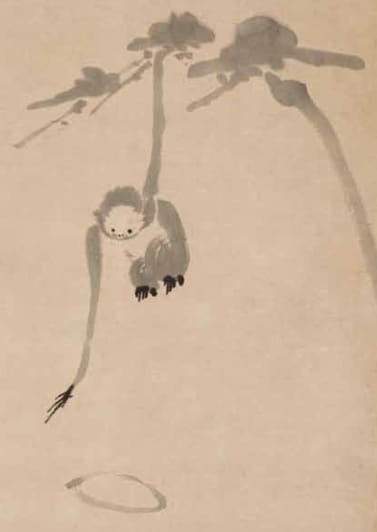THE MONKEY IS REACHING
The monkey is reaching
For the moon in the water.
Until death overtakes him
He’ll never give up.
If he’d let go the branch and
Disappear in the deep pool,
The whole world would shine
With dazzling pureness.
This seems to me a very rich poem. It’s clearly personal as well as general—I doubt anyone could write this who was not capable of seeing himself or herself as just this very monkey, searching desperately, tenaciously for a peace and joy that are obstructed by nothing but the searching itself. What a conundrum that monkey is in! He’s desperate to find some relief, longing for a happiness he senses must be possible, yet he’s unable to stop grasping the imagined safety of the bough of the tree, and unable to keep from longing for and seeking that elusive happiness.
It reminds me of a Daoist teaching I once heard. The large fish can be brought in by an angler on the finest line for one reason only: the fish wants to avoid pain. If it would only lean into the pain, it would snap the line in a moment, and be free. So we too find it hard to stop seeking the pleasure we mistake for happiness. Getting what we want, not getting what we want— which is more helpful as a goad to the path?
And how is the blessed moment of liberation going to arrive? Not through our own efforts, apparently. Yet we must continue our efforts.
Master Hakuin, a great reformer and reviver of koan training, knew all about effort on the Way. He went through years of desperate striving in the course of his own training, longing to have his moments of awakening acknowledged by masters, who were kind and wise enough to withhold the blessing he craved. He famously contracted a severe case of “Zen Sickness”—attachment to the emptiness his meditation had brought him to—and meditated for painfully extended periods in the hope of curing himself of it.
Then finally one day, after feeling himself trapped under ten thousand feet of ice, he was suddenly attacked by a mad old woman wielding a broomstick. She pounced on him for some unknown, imagined offence, and beat him roundly and soundly, leaving him not just battered and bruised, but utterly shocked—shocked to the core of his being, shocked with a shock that filled the universe— and miraculously awakened, liberated. The grip on the bough had given way. He had found at last the single, wide world shining with dazzling pureness, and no one left to hold on.
